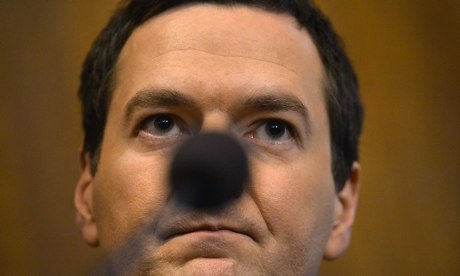
There is a mannered concern in the Treasury over the state of the recovery. Despite outstripping most developed countries in the last 12 months, Britain's latest GDP growth demands furrowed brows and a degree of hand-wringing. Put the trumpets away, says George Osborne, there will be no triumphalism on my watch.
It's a strange response when the figures are taken in isolation. A growth rate for the whole economy of almost 2% is healthy by today's standards even if it is weak compared with previous recoveries. Strengthening the chancellor's arm, the increase in activity in the past year has been a broad-based. Manufacturing has finally moved up a gear and construction firms have put spades in the ground. The services sector, which was already trundling along nicely, has helped bring down unemployment and inflation is in check.
The momentum going into 2014 appears strong and a dip in construction in November is likely to prove temporary. Excluding oil and gas production, which is locked in a decade-long decline, the economy is only 0.3% smaller than its 2008 peak and not the 1.3% that the headline figures suggest.
As senior economic adviser at PwC (and former MPC member) Andrew Sentance points out, if UK economy continues to grow at the same rate as the past three quarters, then average GDP growth this year will be around 3%. Sentance, who is convinced Britain is ready for a return to "normal" interest rates, is keen to demonstrate a buoyancy most other economists failed to detect in the UK from 2008 onwards. The calculation only works if the drag on growth from declining oil and gas is stripped out, but it is certainly one way of interpreting the figures.
Sentance's view chimes with most right-wing thinktanks and less moderate Tories who believe businesses and households who are over-indebted should crash and burn, leaving cash-rich speculators to pick up the pieces on the cheap. It's raw capitalism and good for everyone in the long run, goes the argument.
But as we know it is politically unacceptable for the coalition to go down this road. And that brings us to the hand-wringing. Vince Cable and his supporters are well aware there are key components of the recovery that are still Awol. Business investment kept falling last year when it was supposed to take over from consumer spending as one of the main drivers of growth. Export growth has stuttered to a halt, leaving us with a persistent balance of payments problem before the country really starts to spend and suck in huge amounts of imports.
Then there is the London factor. Along with the south-east, the capital is bounding along while many regions are still propped up by the public sector.
But concerns about the nature and sustainability of the recovery are only one restraint on triumphalism.
The other is the need to continue selling austerity as a key election message. How can the government cheer while it tries to convince a weary electorate they must vote for more cuts?
More importantly, the Tories need to capitalise on surveys that suggest Labour is not trusted to make tough decisions. For Osborne it is the key to electoral victory. As long as there are plenty of tough decisions to make in the second half of the decade, then those who worry about money will be reluctant to vote for Ed Miliband and Ed Balls.
Labour's lead has shrunk to 1% according to the latest Comres poll and behind the headline number is the lack of faith in Labour to make people richer. Whereas 39% have faith in David Cameron and Osborne to make them better off, only 29% place similar trust in Miliband and Balls.

